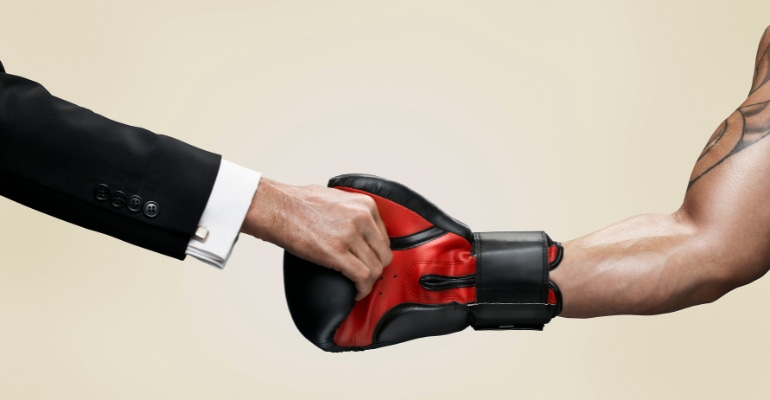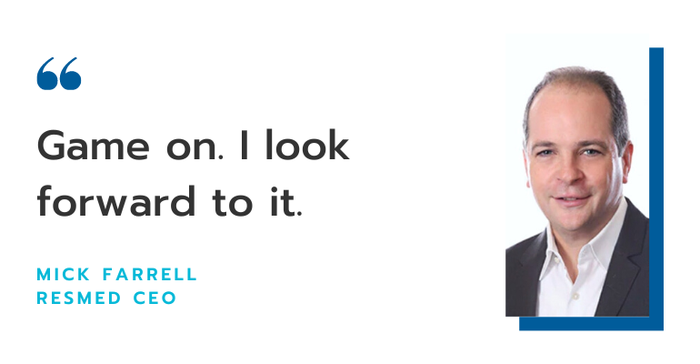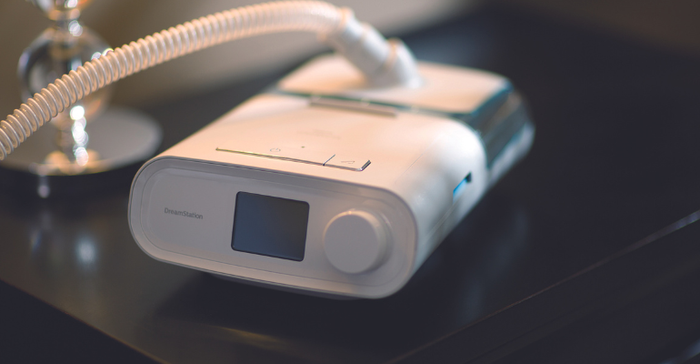ResMed CEO Looks Forward to Competing with Philips Again
ResMed CEO Mick Farrell sounds confident in the company's ability to beat Philips again, whenever the company returns to the sleep apnea market.
May 2, 2023

The big unknown in the sleep apnea device market continues to be when Philips will re-enter the market. An April FDA notice suggests that Philips' product recall impacting the market for CPAP and BiPAP ventilators and other respiratory devices is far from over.
One thing that is clear, however, is that ResMed is more than capable of meeting demand now, and if CEO Mick Farrell is at all afraid of Philips' potential return to the market, he's not showing it. In fact, he seems to be leaning into it.
"We’ve got competitors based in Western Europe and in Asia that we’ve been competing with very strongly for the last few decades and certainly the last two years. And one competitor who’s been out of the market for new patient setups for two years and who knows how much longer, they’ll have to come in [as the] third competitor that will have to come in and start fighting to become the number two share player from a 0% new patient setup share," Farrell said during ResMed's earnings call April 27, according to Seeking Alpha transcripts. "And – we look forward to that. We were beating that particular competitor in 2019 before they had their recalls. So, I know we’ll be able to beat them when they come back in."
ResMed touts having the smallest, quietest, most comfortable, and most cloud-connected devices in the sleep apnea market.
It's more complicated than Coke vs. Pepsi

Farrell said ResMed's goal is to maintain and grow not just its share of the market, but the market size overall. In fact, he sees it as an obligation as the market leader.
"There are now with the latest epidemiology rising up around 1 billion people with obstructive sleep apnea that needs to be treated worldwide. And if you add in COPD, asthma, and insomnia, you’re talking 2.5 billion people in our total addressable market," he said. "So – you can think about share, but it’s really not Coke and Pepsi was out and Pepsi is coming back. This is not a low-growth carbonated beverages market. This is a high-growth digital health technology market in medtech, and that’s how we’re driving it forward."
Philips' CEO Roy Jakobs said during the company's first-quarter earnings call April 24 that resolving the respironics recall for patients remains the company's highest priority, according to Seeking Alpha transcripts.
"We understand how important the sleep therapy devices and ventilators are for patients and how they improve their lives every day at night," Jakobs said. "Resolving this has been and remains our highest priority. It's a complex task, but we are making progress with some ups and downs."
Jakobs said that, to date, more than 95% of the new replacement device and repair kits have been produced and are ready to serve patients. The other 5% of the registered devices are primarily ventilators. The vast majority of the produced lead devices have been sent to patients and home care providers, and Philips is getting the remaining devices to patients as soon as possible, he said.
To further clarify what those percentages mean for U.S. patients, Jakobs said Philips has produced 2.8 million devices for the U.S. market, of which 2.2 million are in the hands of patients, and the company is working through the remainder to get them in the hands of patients during this quarter.
"So, 95% of the total recall units have been produced," he said. "Out of that 95%, 4 million are with patients."
Jakobs said the company expects to publish the toxicological risk assessment of the VOC emissions resulting from ozone-induced foam degradation in the DreamStation 1 devices and to complete testing for System 1 and DreamStation go sleep therapy devices in the second quarter.

"We are optimistic about what this news will mean for patients, whilst we continue to work through the testing for ventilators," Jakobs said.
More than anything, from ResMed's point of view, Farrell sounded anxious to get past the uncertainty of when Philips will return to the market.
"One last thing I’ll say that people have been talking about when the number three competitor comes back. How will they come back? Their CFO last week said, 'Oh, no, we won’t be coming in and lowering prices. We’ll look to take 2019 prices and add with inflation.' So, game on. I look forward to it," Farrell said. "We’ve always competed on value. We’ve always competed on driving that, and it’s never been a competition on price for us. We’ve always been a price premium to the other players, but we save them more money. So that the smart customers are using our products because it’s more profitable."
About the Author(s)
You May Also Like



.png?width=300&auto=webp&quality=80&disable=upscale)
